Working in the animal care industry can be incredibly rewarding for those passionate about animals and their well-being. The industry encompasses various roles and environments, from veterinary clinics to wildlife rehabilitation centres.
Key Roles in the Animal Care Industry
Veterinarian:
- Responsibilities: Diagnosing and treating illnesses and injuries in animals, performing surgeries, prescribing medications, and providing routine check-ups.
- Education: Doctor of Veterinary Medicine (DVM) degree and state licensure.
- Work Environment: Veterinary clinics, hospitals, zoos, research facilities.
Veterinary Technician/Nurse:
- Responsibilities: Assisting veterinarians with procedures, administering medications, conducting tests, and providing general animal care.
- Education: Associate’s or bachelor’s degree in veterinary technology.
- Work Environment: Veterinary clinics, hospitals, and research facilities.
Animal Shelter Worker:
- Responsibilities: Caring for homeless animals, assisting with adoptions, performing basic medical care, and maintaining clean and safe environments.
- Education: High school diploma; additional training in animal care may be beneficial.
- Work Environment: Animal shelters, rescue organizations.
Wildlife Rehabilitator:
- Responsibilities: Caring for injured or orphaned wildlife to release them back into the wild, providing medical care and rehabilitative support.
- Education: Various certifications and training programs in wildlife rehabilitation.
- Work Environment: Wildlife rehabilitation centres, nature reserves.
Animal Trainer/Behaviorist:
- Responsibilities: Training animals for obedience, service, or entertainment, addressing behavioural issues, and developing training programs.
- Education: Varies; may include certifications from professional organizations.
- Work Environment: Training facilities, zoos, private practice, entertainment industry.
Pet Groomer:
- Responsibilities: Grooming animals to maintain their hygiene and appearance, including bathing, hair trimming, and nail clipping.
- Education: Training programs or apprenticeships in pet grooming.
- Work Environment: Pet grooming salons, veterinary clinics, mobile grooming units.
Skills and Qualities Needed
- Passion for Animals: A genuine love and respect for animals is fundamental.
- Patience and Compassion: Working with animals can be challenging, requiring a patient and compassionate approach.
- Physical Stamina: Many roles involve physical labour, including lifting animals, cleaning enclosures, and standing for long periods.
- Communication Skills: Effectively communicating with pet owners, colleagues, and sometimes the public.
- Attention to Detail: Observing subtle signs of illness or distress in animals and following detailed care protocols.
Rewarding Aspects
- Making a Difference: Contributing to the well-being and rescue of animals.
- Variety: No two days are the same, providing a dynamic and engaging work environment.
- Personal Fulfillment: The satisfaction of caring for animals and improving their quality of life.
Watch
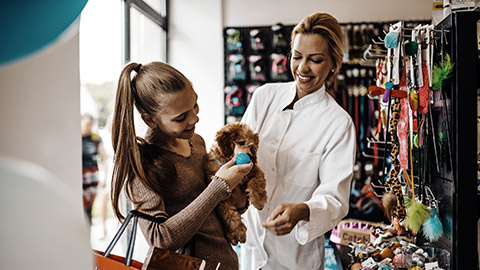
This is Sarah...
Sarah works for Pets Warehouse as a retail assistant and animal care attendant. Pets Warehouse is a large retail chain operating in numerous states around Australia. Sarah is responsible for providing customer service, processing transactions, maintaining stock displays, and caring for the store’s animals, which they sell to the public. These animals include a variety of fish, birds, kittens, puppies, pocket pets, reptiles, and even spiders.
Is it fun working in a pet shop with all the adorable animals?
It can be quite fun; I get to interact with animals each day, and I am allowed to take the cats and dogs out of their cages and have a five-minute cuddle with them, but there is still a lot of work that has to be done in-between and some of it involves handling the not so cute animals like the spider!
What are your main duties?
I arrive at 7.30 am each day, which is before opening hours. This is when the animals are fed and have their cages cleaned as they are usually quite messy from the overnight period, I also have to prepare the shop floor by putting out displays and turning on lights and equipment. There are quite a few policies and procedures regarding these tasks, when I first started, I had to refer to them quite a bit but now I know most of the processes. There are some strict laws regarding keeping animals in a retail environment, and we need to consider these laws when developing store policies.
Once the shop opens, I have to monitor all the customers in the store; some need assistance, and others are just browsing. It is important to ensure nobody tries to steal anything or pat the animals. I must approach each customer and politely offer advice on our products, services, or animals.
When there are no customers in the store, I am expected to clean, undertake stock control tasks, or groom the animals. There is always something that needs to be cleaned; animals are messy! We also receive a lot of deliveries that need unpacking and storing or displaying. Our animals also need to look their best so that they sell, the long-haired cats and dogs need regular brushing and sometimes we have to clip claws or clean their teeth.
At the end of the day, after closing, we have to feed the animals again, clean the enclosures, and secure their cages for the night. We also clean the store thoroughly, including sanitising the floors, work surfaces, and equipment.
Do you work with many other people?
My store is quite large, so some other people are always on duty, such as retail assistants and animal care attendants. We work well together, and it's fun to chat with my colleagues while I am doing my duties. There are also a few supervisors, and one will always be rostered on shift with us. I don't need close supervision because I've been doing this job for a while. However, it's always reassuring to know I have someone to refer to in a tricky situation or answer any of my questions. The supervisors will also give us random instructions throughout the day, especially if we are busy or if there is a special event happening. We must follow up on these requests promptly.
I must provide a verbal report to my supervisor each day on things like animal welfare, sales, stock levels, and any unusual customer requests. When I am speaking with the supervisor, I need to use all the proper terminology for animal breeds, descriptions, and also the various products that we sell, the supervisors don't like to play guessing games with our informal terminology or nick names for the animals.
There are also other people with whom we must interact, such as delivery personnel and the local veterinarian clinic staff who work next door. There is also a grooming parlour a few shops away, and they visit our store regularly. I am expected to liaise with them professionally as they often send us customer referrals, which is good for business.
What is the worst part of your job?
We sell dead animals as food; for example, people with pet snakes feed them dead mice and rats, which were sold frozen and whole, which took me a while to get used to.
I also hate cleaning the spider's cage... normally I let one of my colleagues do that, he loves spiders which I think is weird.
Would you recommend working in the animal care industry?
Despite some of the hard work and sad incidents, it is a very rewarding job. It is also a great job for students because the hours can be flexible. I have two colleagues who are studying at university to become veterinarians, and they find this type of job to be a great orientation for the larger animal care industry.
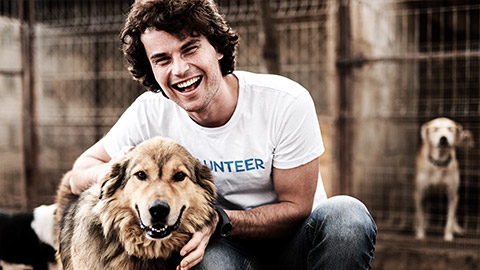
This is Travis...
Meet Travis, a dedicated professional at an Animal Welfare League who plays a crucial role in the animal care industry. With a deep passion for animal welfare, Travis works tirelessly to ensure the health and well-being of needy animals. His responsibilities range from daily care and medical attention to coordinating adoption programs and community outreach. Travis's commitment to advocating for and improving the lives of animals makes him an invaluable asset to the league and a champion for animal rights. His compassionate approach and unwavering dedication inspire everyone around him.
Is working with all the adorable animals at the Animal Welfare League is fun?
Working with all the adorable animals at the Animal Welfare League is incredibly fun and rewarding! Every day brings new experiences and the chance to make a real difference in the lives of animals. I get to interact with various animals, each with their unique personality, and it's heartwarming to see them thrive under our care. Whether it's playing with a playful puppy, comforting a shy cat, or helping an injured animal heal, the joy and satisfaction I get from my job are unmatched. It's hard work, but knowing I'm making a positive impact makes it all worthwhile.
What are your main duties?
As someone working at the Animal Welfare League, my main duties revolve around ensuring the well-being of the animals in our care. I provide daily care, including feeding, grooming, and exercising. I also monitor their health closely, administer medications and treatments as needed and coordinate with veterinarians for any medical issues. Another important aspect of my job is to work on socializing and training the animals to improve their chances of finding loving forever homes through adoption programs. Additionally, I handle administrative tasks like maintaining records and assisting with adoption paperwork. My goal is to ensure that every animal receives the love, attention, and support they need to thrive.
Do you work with many other people?
Yes, I work closely with a team of dedicated individuals at the Animal Welfare League. We're a passionate group united by our commitment to animal welfare. We collaborate on various tasks, from caring for the animals to organizing adoption events and outreach programs. My colleagues include fellow animal care specialists, veterinarians, adoption counsellors, administrative staff, and volunteers. We all share a common goal of positively impacting the lives of animals in need. Working alongside such caring and supportive individuals who share my passion for helping animals is incredibly rewarding.
What is the worst part of your job?
The worst part of my job is undoubtedly witnessing the suffering and neglect that some animals have endured. It's heartbreaking to see animals who have been abused or abandoned, and it can be emotionally draining to confront their pain and trauma. Additionally, making difficult decisions about the future of animals too sick or injured to recover fully weighs heavily on me. Despite the challenges, I find solace in knowing I'm doing everything possible to provide these animals with the love, care, and compassion they deserve.
Would you recommend working in the animal care industry?
I would wholeheartedly recommend working in the animal care industry. It's a deeply fulfilling career path that allows you to make a meaningful difference in the lives of animals daily. If you have a passion for animals and a desire to advocate for their well-being, this industry offers endless opportunities for personal and professional growth. Working with animals can be incredibly rewarding, and your bonds with them are truly special. While it can be challenging, knowing you're helping needy animals makes it all worth it. If you're considering a career in animal care, I encourage you to pursue your passion and positively impact the lives of animals.
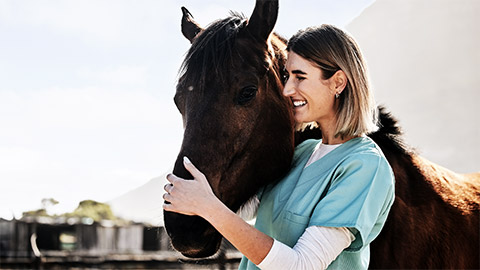
This is Sam...
Meet Sam, a dedicated professional in the animal care industry with a special passion for working with horses. With years of hands-on experience, Sam has become an expert in equine care, combining her deep understanding of animal behaviour with her compassionate approach. Whether it's grooming, training, or providing medical care, Sam ensures that each horse receives the highest standard of care. Her commitment to the well-being of these magnificent animals is evident in every aspect of her work, making her an invaluable asset to the animal care field.
Is it fun working with all the horses?
Working with horses can be incredibly rewarding and fun!
Working with horses is not just a job; it's a true passion. The daily interactions with these intelligent and majestic animals bring a sense of fulfilment and excitement. Each horse has its unique personality, and building trust and forming bonds with them is a deeply satisfying experience. From the thrill of a morning ride to the quiet moments of grooming and care, every day offers something new and engaging. The challenges are balanced by the joy of seeing the horses happy and healthy, making every moment spent with them worthwhile.
What are your main duties?
- Grooming and Maintenance: Regularly brushing, bathing, and cleaning horses to ensure their coats are healthy and parasite-free.
- Feeding and Nutrition: Preparing and providing balanced diets tailored to each horse's needs, ensuring they receive proper nutrition.
- Exercise and Training: Implementing exercise routines and training programs to keep the horses physically fit and well-behaved.
- Health Monitoring: Observing horses for signs of illness or injury and administering basic first aid. Coordinating with veterinarians for medical treatments and vaccinations.
- Stable Management: Keeping the stables clean and safe, managing bedding, and ensuring the horses have a comfortable living environment.
- Hoof Care: Scheduling regular farrier visits for trimming and shoeing and checking hooves for signs of damage or infection.
- Record Keeping: Maintaining detailed records of each horse's health, diet, exercise, and veterinary treatments.
- Handling and Transportation: Safely handle horses for various activities and transport them as needed, ensuring their safety and comfort during travel.
- Education and Communication: Educate horse owners and other staff on proper horse care techniques and communicate effectively with team members to ensure smooth operations.
Do you work with many other people?
- Veterinarians: I frequently coordinate with veterinarians to ensure the horses receive appropriate medical care, vaccinations, and treatments.
- Farriers: Regular collaboration with farriers is essential for hoof care, including trimming and shoeing.
- Stable Hands: I work alongside stable hands who assist with daily tasks such as feeding, cleaning, and basic care.
- Trainers and Riding Instructors: Depending on the facility, I may work with trainers and riding instructors to develop and implement horse training programs.
- Other Animal Care Professionals: I also collaborate with equine nutrition, physiotherapy, and dentistry specialists.
- Horse Owners and Clients: Educate and communicate with horse owners and clients about proper care and any specific needs or health issues of their horses.
- Facility Managers and Administrators: Working with facility managers to ensure the smooth operation of the stables and managing administrative tasks such as scheduling and record-keeping.
What is the worst part of your job?
- Emotional Strain: Dealing with the illness or loss of a horse can be emotionally taxing, as strong bonds are formed with these animals.
- Physical Demands: The job is physically demanding, requiring long hours of manual labour, which can lead to fatigue and physical strain.
- Weather Conditions: Working outdoors means being exposed to harsh weather conditions, whether it's extreme heat, cold, or rain.
- Unpredictable Behavior: Horses can be unpredictable, and handling them can sometimes lead to injuries for both the horse and the handler.
- Long Hours: The job often requires long hours, including early mornings, late nights, weekends, and holidays.
- Emergency Situations: Dealing with medical emergencies or injuries can be stressful and requires quick, effective responses.
- Cleaning and Maintenance: Routine tasks like cleaning stalls and maintaining the stable can be tedious but are essential for the horses' well-being.
- Dealing with Difficult Clients: Sam might occasionally encounter challenging interactions with horse owners or clients with differing opinions on horse care.
Would you recommend working in the animal care industry?
Certainly! Working in the animal care industry can be incredibly rewarding, though it's important to consider both the benefits and challenges.
Some benefits are:
- Passion for Animals: If you love animals, this career allows you to spend your days caring for and interacting with them, which can be deeply fulfilling.
- Making a Difference: You'll play a crucial role in the health and well-being of animals, providing them with the care they need.
- Learning and Growth: The field offers continuous learning opportunities, from understanding animal behaviour to gaining medical knowledge.
- Diverse Opportunities: There are many specializations within the industry, from veterinary care to training, rescue, and rehabilitation.
- Rewarding Relationships: Building bonds with animals and seeing them thrive under your care is immensely satisfying.
Some challenges you may face:
- Physical Demands: The work can be physically strenuous, involving long hours, heavy lifting, and outdoor labour in various weather conditions.
- Emotional Strain: Dealing with sick or injured animals or those in distressing situations can be emotionally challenging.
- Financial Considerations: Some positions in the animal care industry might not offer high salaries, especially entry-level jobs.
- Unpredictable Hours: Be prepared for irregular hours, including nights, weekends, and holidays, especially in roles involving emergency care or farm management.
- Educational Requirements: Some positions, particularly those in veterinary medicine, require extensive education and training.
I find immense joy and fulfilment in her work with horses. She loves the daily interaction with these magnificent animals, the satisfaction of seeing them healthy and happy, and the continuous learning the job provides.
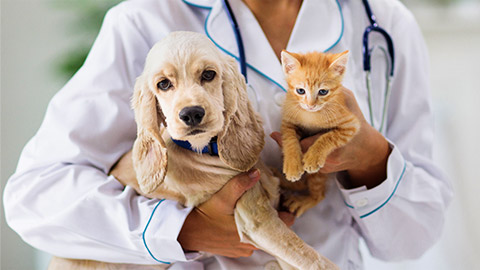
In the animal care industry, the types of animals you may encounter depend on your specific role and the setting in which you work. Here is a breakdown of the various environments and the types of animals commonly found in each:
Veterinary Clinics and Hospitals
Domestic Pets:
- Dogs
- Cats
- Rabbits
- Guinea pigs
- Hamsters
- Birds (parrots, canaries, budgies)
- Reptiles (snakes, lizards, turtles)
Animal Shelters and Rescue Organizations
- Homeless or Abandoned Pets:
- Dogs
- Cats
- Occasionally, small mammals like rabbits and guinea pigs
- Sometimes, birds and reptiles
Wildlife Rehabilitation Centers
Wild Animals:
- Birds of prey (hawks, eagles, owls)
- Songbirds
- Small mammals (squirrels, raccoons, opossums)
- Large mammals (deer, foxes, coyotes)
- Reptiles (turtles, snakes)
- Amphibians (frogs, salamanders)
Zoos and Aquariums
Exotic and Native Species:
- Mammals (lions, tigers, elephants, giraffes)
- Birds (flamingos, penguins, exotic parrots)
- Reptiles (alligators, exotic snakes, lizards)
- Fish (freshwater and marine species)
- Amphibians (frogs, newts)
- Invertebrates (octopuses, spiders, insects)
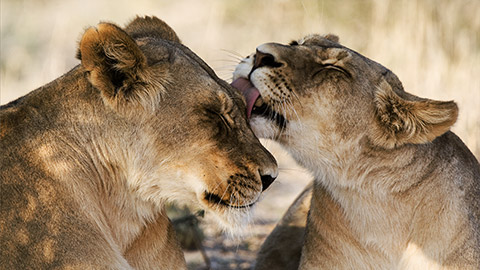
Pet Grooming Salons
Domestic Pets:
- Dogs (various breeds and sizes)
- Cats
- Occasionally, other small pets, like rabbits
Animal Training and Behavior Facilities
Various Animals Depending on Specialty:
- Dogs (service dogs, therapy dogs, obedience training)
- Horses (equestrian training, therapeutic riding programs)
- Exotic animals (in zoos or for entertainment industry training)
- Marine mammals (dolphins seals in marine parks)
Research Facilities
Laboratory Animals:
- Rodents (mice, rats)
- Rabbits
- Primates (in some research settings)
- Fish
- Invertebrates (fruit flies, worms)
Farm and Livestock Settings
Domestic Farm Animals:
- Cows
- Pigs
- Sheep
- Goats
- Chickens and other poultry
- Horses
Equine Facilities
Horses:
Thoroughbreds
- Ponies
- Various breeds depending on the facility’s focus (racing, therapy, recreational riding)
Specialty Pet Stores
Wide Variety of Pets:
- Fish (aquarium species)
- Reptiles (snakes, lizards, turtles)
- Birds (parrots, finches)
- Small mammals (hamsters, guinea pigs, ferrets)
- Exotic pets (tarantulas, scorpions)
Wildlife Conservation and Sanctuary Work
Native and Exotic Wildlife:
- Big cats (lions, tigers, leopards)
- Primates (chimpanzees, gorillas)
- Elephants
- Marine mammals (whales, dolphins in sanctuaries)
- Endangered species specific to the region
Responsibilities Across Different Settings
- General Care: Feeding, cleaning enclosures, and monitoring health.
- Medical Care: Administering medications, assisting with surgeries, and performing routine check-ups.
- Rehabilitation: Providing treatment and care to prepare animals for release back into the wild or adoption.
- Training and Enrichment: Developing and implementing training programs and enrichment activities to stimulate mental and physical health.
- Public Education: Educating the public about animal care, conservation, and responsible pet ownership.
- The diversity of animals you may encounter in the animal care industry makes it a dynamic and interesting field, requiring a broad knowledge base and a versatile skill set.
When you are working in the animal care environment, there will be various roles that you can apply for and undertake. As we explore this module and course, you will be provided with insights and information about the role, the duties you will need to perform, the expectations, etc.
Below, find an example in the case study for the business you will see referenced throughout your learning, 'Happy Paws Animal Care Facility'.
Case Study
